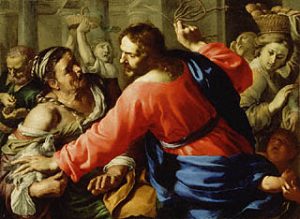3rd Sunday of Lent – Cycle B (Jn 2:13-25)

Jesus clearing the temple
In today’s Gospel Jesus tells the Jews that if they destroy the temple he would raise it up in three days. The Jews of course did not understand what Jesus meant. They, like many of us tend to interpret things far too literally. We have this notion of temples or churches as places where God resides. We forget that God is everywhere; churches are buildings where we go to feel closer to God, to worship and to pray together to our Creator.
St Augustine wrote that
“God’s temple is holy,” and you are that temple: all you who believe in Christ and whose belief makes you love him.
All who believe in this way are like the living stones which go to build God’s temple, and like the rot-proof timber used in the framework of the ark which the flood waters could not submerge. It is in this temple, that is, in ourselves, that prayer is addressed to God and heard by Him.”
St. Paul tells us that we are members of Christ’s body, therefore we are individually and collectively temples of God. St. Paul wrote “Do you not know that your body is a temple of the Holy Spirit within you, whom you have from God, and that you are not your own?” (1 Cor 6:19)
Meister Eckhart, a 14th century Dominican, similarly wrote that “This temple is the human soul, which God has made exactly like Himself, just as we read that the Lord said: ‘Let us make humankind in our image and likeness.’ Nothing else resembles God so much as the human soul.”
In order for us to worship and give praise and thanks to God as we should—we must love and respect others. We cannot love God if we do not love all that He has created. True and honest worship demands that we love and respect those whom He has created in His own image and likeness.
When a scholar of the law asked Jesus “Teacher, which commandment in the law is the greatest?” He replied to him, “You shall love the Lord, your God, with all your heart, with all your soul, and with all your mind. This is the greatest and the first commandment. The second is like it: You shall love your neighbor as yourself. The whole law and the prophets depend on these two commandments.” (Mt 22:36-40)
We must recognize that when we hurt others we are desecrating the temple of the Holy Spirit. We are, in a very real sense, behaving exactly like those vendors and moneychangers who Jesus drove from the temple. When we fail to live by the Ten Commandments, when we lie, steal, or covet what others might have, when we lash out in anger, criticizing people, or causing them pain we are desecrating their temples, their places of worship, and God’s holy sanctuary.
Loving God means loving all that God has created because He created all out of love. Underlying my student’s question was an important and fundamental fact. While we, as children of God, who have been created in His image and likeness, must love all that God has created, we are not required to like everyone.
God created each of us out of love but not all return his love by following His commandments. We are not asked to love evil, to condone or support those who may do us harm, to promote hatred, bigotry, or violence.
I believe that Jesus gave us the words and showed us, by his example, how we must love others, when, at his crucifixion, he prayed to God and said “Father, forgive them, they know not what they do.” (Lk 23:34)
As we reflect on today’s readings, let us recognize that we are all the body of Christ, the ever living temple of the Holy Spirit; let us join together in love to worship God who created each of us in love, with love, and for love. Amen.
